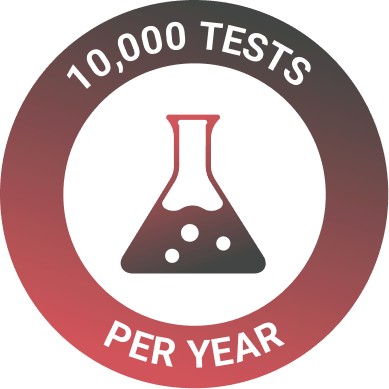Home >> Antibacterial >> ASTM D4783
ASTM D4783 – Assessing Resistance of Adhesives Preparations to Microbial attack in container
ASTM D4783 was laid down in 2001 by the American Society for Testing and Materials to determine the resistance of liquid adhesive preparations to microbial attacks in a container. Adhesive specimens are challenged with bacteria, yeast, or fungi cultures and checked for their ability to return to sterility.
ASTM D 4783 Test Conditions & Requirement
The parameters specified by ASTM D 4783 standard are as follows:
Test conditions | |
Test organisms Bacteria | Pseudomonas fluorescens (ATCC 9721) Pseudomonas aeruginosa (ATCC 10145) Bacillus subtilis (ATCC 6984) Proteus vulgaris (ATCC 9920) |
Fungus | Aspergillus niger (ATCC 9642 ) Aspergillus flavus (ATCC 9643) Penicillium pinophilum (ATCC 9644) |
Yeast | Candida tropicalis ( ATCC 750) Candida pseudotropicalis (ATCC 4135 ) Kluyveromyces fragilis (ATCC 8554) |
Challenge and Sterility checks (Hrs and Days) | 4, 24, 48, 72 hrs and at 7 days |
Incubation Temperature (°C) | Bacteria and Yeast: 30-35 ; Fungus: 20-25 |
Inoculum size | Bacteria : 1.0 x 10^8 bacteria/mL |
Yeast: 1.0 x 10^7 yeasts/mL | |
Fungus: 1 x 10^6 spores/mL | |
Passing Criteria (Growth Rate) | Light: Positive |
Medium: Positive | |
Heavy: Positive | |
Absence of growth: Negative | |
ASTM D 4783 Test Method
- The adhesive specimen is challenged by inoculating a bacteria, yeast, or fungi culture, which may be a single species or a mixed culture of several species.
- The inoculated adhesive specimen is stored at a controlled temperature for definite intervals or days when cultures (streak plates) are made at preset intervals.
- At any point in the series of challenges, the test is discontinued if the inoculated specimen shows microbial growth on the streak plates made during the week following the challenge (indicating that it has not returned to sterility). The sample is reported as not resistant to attack in the container by the species or combination of species used as the inoculum.
- If the culture shows no growth, the test is repeated with up to four challenges. If the specimen tests out as sterile following the fourth challenge, it is reported to be resistant to attack in the container by the specific strains or combination of species of bacteria, fungi, or yeast used in inoculum.
- The time necessary to kill is determined by noting the earliest streak plate to read sterile.
Importance of ASTM D 4783 Test
- The ASTM D 4783 Test demonstrates whether an adhesive preparation is sufficiently protected with biocide to resist bacteria, yeast, and fungi attacks during storage.
- ASTM D 4783 is patterned after methods used by biological laboratories serving the adhesive industry from biodeterioration of adhesives.
- This test method is advantageous when tested against wild-type microorganisms isolated from contaminated adhesives to determine the amount and type of biocide necessary to kill or inhibit the growth of the contaminants.
Why Choose Microbe Investigations (MIS)?
Discover the full spectrum of our comprehensive antimicrobial testing portfolio at Microbe Investigation Switzerland (MIS). Our services strictly adhere to international standards, ensuring precise and reliable results. With our team of experts and a certified advanced laboratory setup, we are committed to providing fast turnaround times for all your testing needs, including biocide adhesive samples following ASTM D 4783 guidelines.
For more detailed information on our testing services, turnaround times, or any other inquiries, contact us today.



FAQs
ASTM D4783 test is performed to determine the resistance of liquid adhesive preparations to microbial attack in the container. This method involves exposing adhesive specimens to specific cultures of bacteria, yeast, or fungi to assess their ability to withstand contamination and degradation over time.
ASTM D4783 test applies to Adhesive Prepared in a Container, which is attacked by Bacteria, Yeast, and Fungi and becomes resistant towards them.
ASTM D4783 test takes 2-6 weeks to complete.
At Microbe Investigations, we test for ASTM D4783 using the following microbial strains: Pseudomonas fluorescens (ATCC 9721), Pseudomonas aeruginosa (ATCC 10145), Bacillus subtilis (ATCC 6984), Proteus vulgaris (ATCC 9920), Candida tropicalis (ATCC 750), Candida pseudotropicalis (ATCC 4135), Kluyveromyces fragilis (ATCC 8554), Aspergillus niger (ATCC 9642), Aspergillus flavus (ATCC 9643), and Penicillium pinophilum (ATCC 9644)
Contact us for more information
Explore Other Tests
ASTME2149 | AATCC-100 | JISZ2801 | JISL1902 | EN 1276 | ISO 22196 | ISO 20743 | ISO 846 | ASTM E2180 | AATCC 147 | ASTM D7907-14 | ASTM E3031 | ASTM G29 | EN 16615 | EN 13697 | PAS 2424 | EN 1040 | EN 14349 | EN 13727 | EN 14561 | ASTM G22 | ASTM E1153 | ASTM D2574 | AATCC 174 | EN 14563 | EN 13704 | EN 1499 | EN 1500 | EN 14347 | EN 14348 | EN 1656 | EN 16437 | EN 12791 | ASTM E1174 | ASTM E2362
AATCC 30 | ASTM G21 | EN 1650 | EN 1657 | EN 13624 | EN 1275 | ASTM C1338 | ASTM D5590



